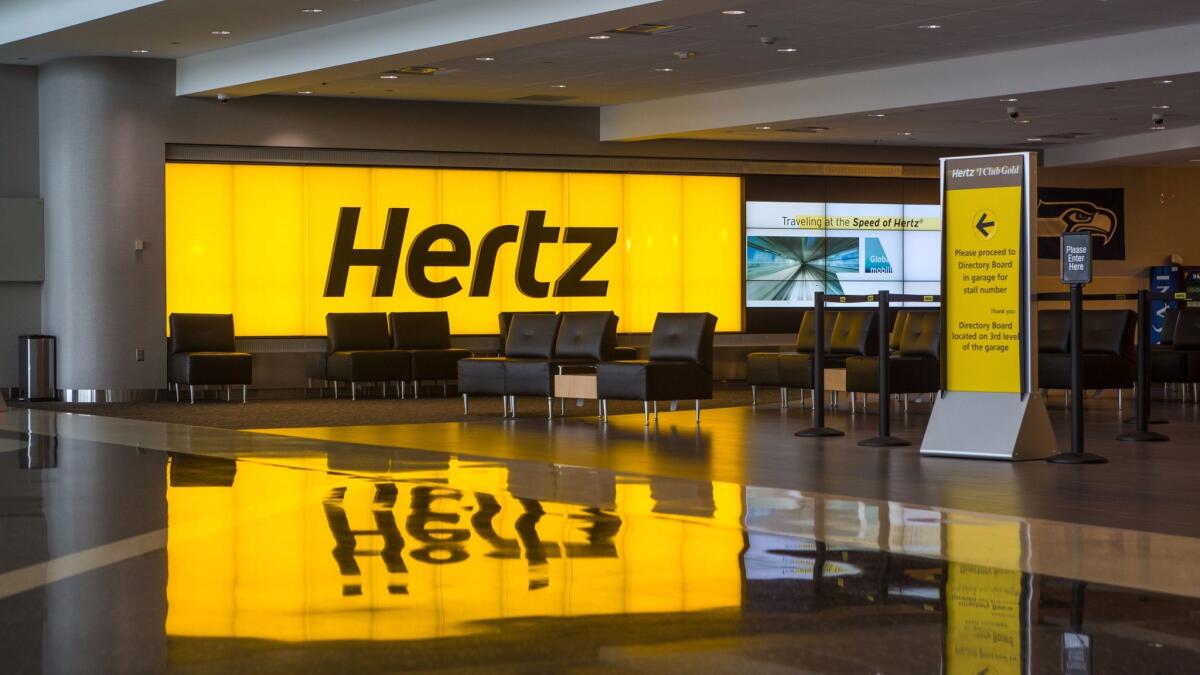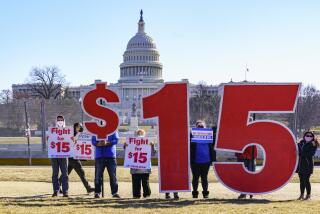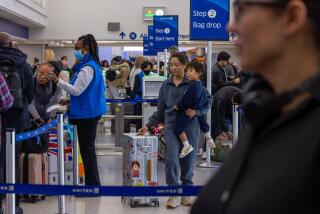Rental car workers at Seattle airport win nearly $2 million in lawsuit over $15 minimum wage

Workers here in the first U.S. city to establish a $15-an-hour minimum wage have won another multimillion-dollar settlement in a four-year battle to force employers to abide by the new law.
The $2-million settlement announced this week by the state Department of Labor and Industries involves back pay and interest for more than 150 employees of Hertz and Thrifty car rental agencies at Seattle-Tacoma International Airport.
“Now that this agreement is in place,” said department Director Joel Sacks, “we’re moving ahead to get this money into the hands of the people who worked hard for it. The funds will make a real difference for these workers and their families.”
Some will receive checks for as much as $30,000 in lost income, the result of employers paying lower hourly wages as they disputed the law and pursued drawn-out legal challenges.
The Department of Labor and Industries said the nearly $2-million agreement is one of its largest settlements over back pay in recent history.
“From our perspective,” said Sage Wilson of Working Washington, a workers’ advocacy group that backed the SeaTac effort, “there’s a story here with regard to the years of increasingly absurd tactics many SeaTac employers have used to try and avoid following the law — court case on court case on court case. And then, after losing and losing and losing, just sort of trying to ignore back pay.”
Voters in SeaTac, a city of 29,000 that surrounds the airport and adopted its nickname, passed the minimum wage law in 2013. The proposition won narrow approval — a margin of 77 votes out of 6,003 cast. A recount didn’t change the outcome.
When the law took effect in 2014, some businesses, including those within the airport boundary, refused to pay the new minimum.
In 2015, however, the state Supreme Court upheld the law and also ruled it applied to businesses at the airport, which is operated by the Port of Seattle.
The ruling allowed workers to file claims with the state to recover lost wages from the employers. Others joined class-action lawsuits to recoup the unpaid differences.
The Department of Labor and Industries said Wednesday that Hertz and DTG Operations Inc., which operates Thrifty, formally signed the settlement Aug. 18, agreeing to pay back wages totaling $1.51 million plus $458,651 in interest. Under the agreement, the state waived any penalties and did not require an admission of wrongdoing by the companies.
Last September, settlements in two dozen cases brought by airport transportation and hospitality services workers resulted in more than $12 million in back payments for current and former workers.
The largest payment, $8.2 million, was made by Menzies Aviation, which furnishes baggage handlers and ramp workers for Alaska Airlines. The recipients were 738 past and current workers who had been paid just $12 an hour. Each received an average of $10,000 after attorneys’ fees, according to court records.
Prospect International Airport Services Corp. agreed to pay 291 workers nearly $2 million to settle its claim, and PrimeFlight Aviation Services paid more than $1.8 million to 152 workers.
James Kiboneka, a 61-year-old former PrimeFlight worker, told the Associated Press that this money should have been paid when he earned it. “It’s coming late,” Koboneka said, “but of course this is a victory.”
He said he planned to use his $8,488 payout to cover bills and other expenses.
Seattle was also a minimum-wage trailblazer after its City Council approved a $15-an-hour measure in 2014, becoming the first big municipality to do so. But the increase is being phased in over seven years. Seattle’s plan has since been adopted, with variations, by other cities and states across the U.S. as the $15-an-hour movement grew.
California, for one, will raise its minimum wage to $15 hourly by 2023, while New York recently passed an increase to $15 that will rise incrementally, with some counties on a faster track than others.
Critics of the SeaTac law predicted the forced wage increase would stifle the city’s growth and result in fewer jobs.
An ongoing University of Washington study of minimum wage laws found that some worker hours were in fact reduced as a result of the change — costing each of them $125 in monthly earnings. But it did not affect the number of low-wage positions available.
SeaTac also recently announced it has nine hotels under development.
Anderson is a special correspondent.
ALSO
Amazon is searching for new headquarters, and L.A. wants to be in the running
‘Leave. Get out’ if ordered, Florida governor says as monster storm bears down
More to Read
Sign up for Essential California
The most important California stories and recommendations in your inbox every morning.
You may occasionally receive promotional content from the Los Angeles Times.










